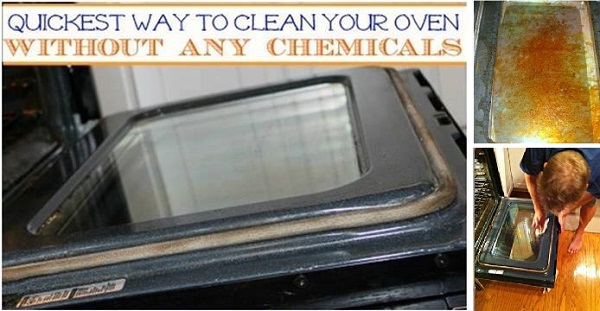Making sure your home and appliances are clean is just one of those things that show you are a responsible person. So, without further details, we present you today how to clean your oven without chemicals. Maybe some products manufactured at an industrial do have results, but a DIY solution is always at your disposal. Before starting, make sure you have these:
- a cup of water;
- a third of a cup of white vinegar;
- half a cup of baking soda;
- half a cup of Kosher salt;
- a scouring pad;
- a spray bottle;
- a razor blade;
Here is what you will need to do for cleaning the oven in a more chemical-free way. First of all, mix the water with vinegar directly in the spray bottle. Apply it on the inside and outside of the oven (meaning the door). Make sure you didn’t use all of the contents. Afterward, take the salt and sprinkle a thick layer of it over the sprayed mixture. Pour the baking soda over as well and finish with another round of spraying. Now, leave it to soak in for about 30 minutes. Then, scrub a bit hard with the scouring pad and don’t stop until you notice the crud coming off from the oven. With the razor blade and the mixture being wet all of the time (you do not want it dry because the result will be a scratched oven instead of a clean one), remove any remainder of crud. That’s it!
source: cookitallergyfree.com
















Dos ist just work with kosher salt?
Corse salt would be the generic way of saying it
LOL !
Koshering salt is different from table salt because it doesn’t contain anti-clumping chemicals or iodine. Regular salt tends to dissolve quickly (which is why it’s used to flavor foods) where Kosher salt was used to absorb blood and fat from curing meats. That’s pretty much what this method is using the salt for – ovens get spattered with fluids from roasting meat.
And, since it doesn’t dissolve as quickly, the salt in this case becomes a coarse grit when scrubbing.
Thanks for the explanation regarding the salt as Kosher salt isn’t available where I live. I do have sea salt so will see if that works just as well.
kosher salt is not rare and most likely available where you live.
I always appreciate advice & like to try them out!!
Thank you much appreciated!!
God bless
Nice idea but salt = sodium chloride and vinegar = acetic acid. Sound like chemicals to me. By the way you are composed of chemicals, so is everything else. Chemical free is meaningless.
Thank you SO much for saying what I’m always thinking when I run across sites like these.
We are nothing more than little chemical processing plants ;->
Besides, if you want your oven clean, you use lye. These folks all have self-cleaning ovens that clean most of the crud off, but if you have a ‘restaurant’ stove/oven you have got to use lye to clean it. Nothing else, NOTHING ELSE will work. Nasty stuff, don’t breathe it, don’t get it on your skin, but its toxicity is in that it is extremely alkaline.
Because some people are too stupid to read warning labels should not mean that those of us that UNDERSTOOD OUR HIGH SCHOOL (NOT EVEN COLLEGE) chemistry class, shouldn’t be allowed to use it.
Well all of this is true, but if you don’t like sites like this, why troll them?
If you don’t like sites like this, why troll them?
Oops sorry I said that twice…lol my apologies!
I guess it’s lost on some that the author is speaking of “harsh” or hazardous chemicals. Most would understand that. Lye is a corrosive (hazardous) chemical. Did you learn that in HIGH SCHOOL CHEMISTRY CLASS?
WOW. Some people may just choose not to expose themselves or their family to caustic chemicals. Yes, vinegar and baking soda do make a “chemical” reaction. This is obviously geared toward people who want to avoid potentially harmful substances, and maybe even cost friendly as most people would probably already have these ingredients on hand. If anyone takes offense to this article, they are obviously very bored and it’s a slow news day. Geesh.
Ok Yvonne. You’re right. Tell you what, I’ll give your kids some 2,3,7,8-Tetrachlorodibenzo-p-dioxin and some sodium chloride. Which one are you gonna let your kids play with?
(Note, I’d prefer if you let them play with the first one since I don’t think the mean-spirited or stupid should multiply).
Die Pedants!! All of you!!!
Totally agree! Even water (H2o) is a chemical compound. Silly writers!
The basic ingredient of oven cleaners is lye (either sodium hydroxide or potassium hydroxide).Lye is a corrosive, lye was used to dissolve bodies because of its destructive effects on living tissues (e.g., skin, flesh, and the cornea). Solutions containing it can cause chemical burns, permanent injuries, scarring and blindness, immediately upon contact. Lye may be harmful or even fatal if swallowed; ingestion can cause esophageal stricture. Moreover, solvation of dry solid lye is highly exothermic; the resulting heat may cause additional burns, or ignite flammables.
Salt and vinegar on the other hand you can eat with out dying from the first bite. An over abundance of salt can lead to medical problems but with all thing we must practice restraint. Gluttony is dangerous not salt or vinegar.
So when someone says “chemical free” they mean the kind that are dangerous from the start not the ones that become dangerous through gluttony. So “chemical free” is not meaningless.
A chemical compounds are not defined by how dangerous you may think they may, or may not be. A more accurate title than, “Quickest Way To Clean Your Oven Without Any Chemicals”, would have beneficial as to not confuse people as to the definition of the word “chemical”. Kudos to the article for showing a less caustic solution to cleaning your oven.
It seems to me that it only the door that is been cleaned with this. What about the inside of the oven itself????
Just use a Norwex cloth with water. That is chemical free.
water is a chemical.
I am always surprised (by now I shouldn’t be) by snarky remarks. In this day and age we all know, or should know, what chemical free means. I have family members with asthma, and other chronic breathing problems. Because of this we choose to use non toxic chemicals in our home. Maybe the pedantic people among us are a bit happier with that wording? Sheesh
Hey pedantic morons! You realize the author meant highly toxic chemicals, right? Of course you did.
Let your kids play with the chemicals in commercial oven cleaner and keep the salt and vinegar away from them. That way, at some point in the future we may rid ourselves of dickish pedants.
Die pedants.
Allowing people to misuse the meaning to words allows for mediocrity and a dullment of the human intellect. Wars were waged over the misuse of words. Are you okay with that?
My grandmother used to just put a pan of ammonia inside the oven and let it sit there for 24 hours. Then just pour the ammonia back into the bottle. Then just use a scrubby brush and the crud will come right off! You don’t have to touch the chemical or use any of it ON the surface of the oven! Just remember to turn the fan on over your oven to suck any of the fumes out of the house!! And FYI, I’m not sure about ALL ovens…but on mine you can remove the oven door to clean it and be able to reach the inside of the oven more easily.
This sounds like a no chemical way to clean an oven to me…no waste either
Elbow grease usually the answer to most things!
Fyi, baking soda neutralizes vinegar making it just slightly salty water. So what you’re left to clean with is just salt water.
Dihydrogen oxide, a deadly chemical, is in this ‘safe’ formula.
Every person on the planet who has even been in contact with dihydrogen oxide has died.
Eddison, I must be a superhero. I took a shower in the stuff just this morning and lived. I think some got in my eyes though, it must have been diluted by the lye soap I was using. 😀
and you will die someday. as will I and everyone else.
The best thing I have used to clean glass off of ovens or wood stove glass…… Take a damp cloth dip the cloth into ashes from your wood stove and swirl the ashes on the glass like wax then take a clean cloth and wipe off
I have used only baking soda solution. Mix baking soda 1/2 cup with 2 cups of water in a spray bottle. Spray the oven every couple of hours for several days, and wipe off.
Dan a man
These comments provide good entertainment, did I spell that right I didn’t pay attention in high skool either.
You don’t need to clean your oven if you don’t make a mess, I use cookie sheets, anything they don’t catch let the oven set at 500 F for ~ half hour, anything that don’t burn off it will next time. Cookie sheets soak in sink, soak long enuf it all comes off.
Why don’t all of you jerks leave your oven dirty and get on with kife
So….has anyone actually tried this? I would like too….but I also like to see if someone else was brave and tried it first Lol.
I’ve used vinegar and baking soda mixtures before on an oven interior and oven glass door. As someone said earlier, elbow grease (and patience) is the key here. Baking soda seems to help cut through the grease, but the scouring pad and razor blade are doing the real work. I’ve used baking soda and vinegar separately for cleaning and while they can be useful, I’ve never understood the fascination with mixing the two together. A bubbling, fizzy explosion is fun to watch but it’s never going to clear out the hair and gunk from a clogged sink.
Maybe it needs to be a little more literal for you, bless your heart, dangerous chemicals.
Lol